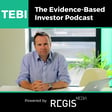Introduction and Episode Overview
00:00:02
Speaker
Hello and welcome to the Tebbe podcast from The Evidence-Based Investor. I'm Robin Powell and this podcast is brought to you by Regis Media, a niche provider of educational and marketing content.
00:00:16
Speaker
for financial advice and planning firms.
Challenges Faced by ARC Innovation ETF
00:00:20
Speaker
Today we are discussing Cathy Wood, the celebrated Wall Street fund manager who, frankly, has very little to celebrate just at the moment. Her flagship ARC Innovation ETF ended 2021 in a 40% drawdown that only worsened to nearly 50% in the first few days of January.
00:00:41
Speaker
So, is Cathy's arc sinking? What, if anything, should arc investors do now?
Global Equity Markets Concerns
00:00:49
Speaker
Do arc's current problems tell us anything about the current state of the global equity markets? And what are the lessons to learn from this whole episode?
Introducing Larry Suedro and Cathie Wood's Background
00:01:00
Speaker
I've been speaking to Tebbi contributor and investment author, Larry Suedro. So, Larry, for those who don't know, who is Cathy Wood?
00:01:11
Speaker
What sort of fund is it that she runs? Cathy Wood became famous really in 2020 when her AHRQ Innovation Fund, her lead fund, put in a spectacular performance going up 157% that year. And that gave her a first percentile ranking in Morningstar, something she had actually achieved also
00:01:40
Speaker
in 2017 when the fund earned 87%. However, in three of the six years between the inception in 2014 and 2020, the fund didn't do very well. And one year was the 75th percentile, another 98th, meaning almost the worst. And then in 2019, it was 57th percentile. But that performance in 2020
00:02:09
Speaker
gave it a great five year track record and her disruptive technologies, companies she thought would change the world. Their return was so spectacular that it gave her a first percentile ranking for the full five year period. And that led to massive inflows of cash. The fund just three years earlier had only 200 million.
00:02:35
Speaker
because it had not done well prior to 2017. And now it was sitting on 21.5 billion and then it increased even more because in the first six weeks of 2021, the fund again put in a strong performance and the assets peaked at about 28 billion during 2021.
Social Media Influence and 2021 Performance
00:03:01
Speaker
So how famous did she become and what
00:03:04
Speaker
sort of things were people in the US saying about her. Yeah, so in a column written for Bloomberg, Matt Winkler said this. He said, Kathy Woods' magic touch is so powerful these days. She can trigger gains for fun. She doesn't even run.
00:03:26
Speaker
And she has a mass of following on Reddit, which, you know, if you followed it all, what happened with GameStop and others, kinds of these meme stocks, they would have tremendous performance when somebody, you know, the Reddit crowd jumped in. Now, of course, as often happens with people who are thought to have a magic touch,
00:03:56
Speaker
The wheels came off pretty spectacularly in 2021, didn't they? Tell me about that.
Investor Behavior and ARC Fund Losses
00:04:03
Speaker
Yeah, the fund lost 24% roughly for the year, but even worse than that are two things. One, in mid-February, it was up quite a bit. So from its peak at that point until year end, it actually lost 37%. And then investors,
00:04:26
Speaker
who tend to be naive performance chasers, rush in after spectacular returns, and then they leave after the bad returns happen. So, Cathie Woods is fun, went from 28 billion
00:04:43
Speaker
ended the year at about 16 billion. And so the gains came when she had much smaller assets under management. The worst losses came when the assets were the largest, the 28 billion. And the fund has gotten off to a horrific start in the first trading days of this year, down roughly 10% as we speak.
00:05:11
Speaker
Now, some people say the first few trading days of the year set the tone, if you like, for the 12 months ahead. Is that just an old wise tale, if you like, or is there some truth in it?
00:05:27
Speaker
Well, I think it's somewhere in between. Obviously, if stocks go up in the first month of the year, then the odds are better that stocks will be up for the full year than if stocks went down. So you can misinterpret
00:05:44
Speaker
information by just looking at how, say, the first month did.
Randomness in Stock Performance
00:05:50
Speaker
There is a tendency for that to be true, that if January is good or the first 10 days, January good, then stocks tend to do better. But I wouldn't put any reliance on that. I think that's just a function of, you know, random outcomes that there's no causation there at all.
00:06:12
Speaker
I was more thinking, Larry, of this rotation, if you like, that we appear to be seeing at the moment away from these big tech stocks. Obviously, last year we saw value rebound and so on.
00:06:35
Speaker
What are we seeing here? I saw you post on Twitter the other day, are we hearing the sound of bubbles bursting? Tell me about that.
Investor Sentiment vs. Company Performance
00:06:47
Speaker
Well, I like to always say when I'm asked about a forecast, my crystal ball is always cloudy because nobody can foretell what events will occur that drive markets. And it's really the unexpected events that cause most of the markets movements. And also investor sentiments can drive markets, at least in the short term, which can be longer than many people think. But I believe this, and I've said this for a while,
00:07:17
Speaker
what we've experienced in the last two years or so from say 2018 through 2020 was virtually an exact repeat of what we saw from 98 through March of 2000, where you saw these hyper growth companies, these disruptive technologies using Cathie Woods's term,
00:07:40
Speaker
did not actually have much better performance in earnings, but their stocks outperformed simply because of investor sentiment, enthusiasm, call it a bubble, prices went way up, their PE ratios jumped way up, and that totally drove the excess returns. And that's exactly what happened again this time around.
Valuation of Growth vs. Value Stocks
00:08:05
Speaker
Value companies had no worse historical earnings growth than they did, and growth companies didn't have better historic growth in earnings, yet their stock prices exploded. And today, we are at levels of the ratio of valuations that growth stocks are at least as expensive as they were,
00:08:26
Speaker
relative to value stocks as they were at the peak of the bubble in March 2000 which meant to me it was highly likely that we would see a rotation and I think it was a bubble is a bubble and you're hearing that now and
00:08:44
Speaker
that sound of it correcting. And we always have good stories, Robin, that the markets tell to justify it. And if you like, we can tell the tale for your audience of Clayton Christensen.
Disruptive Innovation and Financial Failures
00:08:58
Speaker
Yes. Well, I was going to ask you about Clayton Christensen because you actually mentioned him in an article that you wrote for the blog, The Evidence-Based Investor, back in May of last year.
00:09:12
Speaker
And he, in a sense, was the Cathie Woods of his era, wasn't he? Tell me about Clayton Christensen. Yeah, Clayton Christensen wrote a book in 97, The Innovator's Dilemma, the revolutionary book that will change the way you do business. And The Economist, one of the most prestigious publications in the world,
00:09:36
Speaker
called it one of the six most important business books ever written. And they talk about in the book companies that would change the world through their disruptive technologies. And Clayton Christensen was hailed
00:09:52
Speaker
as a management guru and a rising star of the new economy. He was the most innovative business thinker in the world today, according to Business Week in 2001. And so he formed, just like Cathy,
00:10:11
Speaker
Well, you know, why not take advantage of this and create a mutual fund that invests in these disruptive technologies that will topple the market leaders? Well, even before the fund reached its first anniversary, it was liquidated, but not before it lost 64% of its value. The only thing that disrupted was the financial health of its investors.
00:10:37
Speaker
And of course, this is nothing new, is it, Larry? I mean, market history is littered with examples of disruptive technologies like
00:10:49
Speaker
at trains, for example, here in the UK in the 1890s, believe it or not, we had a bicycle bubble. Then we had the development of the internal combustion engine and sort of cars and so on after the First World War. And we all know what happened in 1929. So there are examples of
00:11:17
Speaker
what look like groundbreaking technologies, and very often they do turn out to be groundbreaking, but it's not investors who benefit, it's consumers who benefit.
Consumer Benefits vs. Investor Losses
00:11:31
Speaker
Do you think a lesson for investors to learn?
00:11:37
Speaker
Yeah, I think a great example is the internet and wireless communication and, you know, telecommunications in general. You know, if you invested in the Worldcoms in the late 90s, you ended up basically bankrupt, and yet the world benefited greatly as the cost
00:12:02
Speaker
of these products and computing and everything else has collapsed. And what people fail to recognize generally, it's often not the innovative disruptive companies that benefit, but the downstream companies that deploy that technology eventually.
00:12:22
Speaker
in all kinds of products and running their businesses that also benefit and consumers benefit as well. So yes, sometimes the winners evolve early, but then others come and disrupt them and we move on. It's very difficult to outperform the market trying to guess which will be the ones that win.
00:12:49
Speaker
Sometimes it's the first players, sometimes it's people further down the road who end up being the winners. But trying to identify and think you're smarter than the market, the evidence says very, very, very few people have been able to do that. Absolutely. So going back to Cathie Wood, in your books and your articles for Tebbi and other sites and so on,
00:13:19
Speaker
You're often talking about luck and skill and how hard it is to distinguish between luck and skill in a fund manager.
Cathie Wood: Skill or Luck?
00:13:30
Speaker
What's your honest opinion about Cathie Wood? I mean, was she very skillful or has she demonstrated skill? Do we have enough data to show that she has demonstrated skill or if you like,
00:13:46
Speaker
did she just take advantage of a bull run in technology companies? Yeah, it's very hard to tell, so I'm not going to comment on whether Gathy Woods is a skillful manager or is she intelligent or not. But I think one could make the simple case, if she was so skillful, why did she have such horrible performance?
00:14:12
Speaker
in the first two years of the fund and incredibly bad performance in the last 13 months or last 12 months or so, where she's down dramatically. She might have just been lucky in the right place in the right time, or we don't know. The problem is this. When you have 10,000 money managers out there, and that's about how many mutual funds are out there,
00:14:42
Speaker
Randomly, we should expect half of them to outperform over one year, 2500 over two years, 1250 over three years, 625 over four, and 320 or so over five years. And yet, anyone who outperforms over a five-year period, right,
00:15:05
Speaker
for five straight years, we claim them as geniuses, but randomly we should expect 300 or so to do that. And yet the evidence shows the top managers over prior decades often go on to be the worst managers.
00:15:23
Speaker
There was a fund from the 70s, which was the Peter Lynch era. He was considered the greatest manager of all time, rang up spectacular returns, but it wasn't the best performing fund. It was actually a fund of my memory serves called 44 Wall Street, the best performing fund of that decade.
00:15:47
Speaker
Now, if you invested the next 10 years with Peter Lynch, the 80s, you did great. If you bought 44 Wall Street, again, if my memory serves, a decade later, $1 invested became 27 cents, despite the fact that the market went up like 18% or 19% a year.
00:16:06
Speaker
Well, how could you say a whole decade was just luck? Well, turned out obviously it was. And you can repeat that exercise almost every decade. Pick a manager who had great performance and then went on to blow up. Legg Masons, Bill Miller, another great example of a fund manager who beat the S&P, I think it was, I don't remember, 17 years in a row, and then blew up after that.
00:16:34
Speaker
Well, as you say, this is a story we've seen again and again. It's also, Larry, I know you're particularly cognizant of the US perspective, but it happens in other countries too. I read, for example, about a manager in China who flops spectacularly last year after
00:16:56
Speaker
You know, several years of stellar returns. We've obviously got Neil Woodford here in the UK. There's a guy called Hamish Douglas at a firm called Magellan in Australia who again appears to have completely lost his way.
00:17:14
Speaker
So again, returning to Cathie Wood, we don't know whether it was luck, skill or a combination of the two that enabled her to produce such a whopping return in 2020.
Skepticism and Market Outperformance Challenges
00:17:30
Speaker
But whatever it was, Larry, has Cathie Wood lost it?
00:17:37
Speaker
Well, if you have skill, you don't lose that skill. It's not like an athlete who gets older and loses their skill. This is intelligence, which should stay relatively stable. So my bet is, if I had to place a bet, Cathie Woods was just someone who got lucky in the right place at the right time.
00:17:58
Speaker
The media loves to annoy stars cause that gives them something to write about even though the logic dictates it's probably noise and there is no real evidence of skill. Show me 20 years of outperformance on a statistically significant basis.
00:18:16
Speaker
And then I'm much more willing to say, yes, here's somebody who really was one of those rare few individuals who had the skill to beat the market. The investors in general are far better off ignoring that and simply accepting market returns
00:18:35
Speaker
and for their asset classes or risk strategies that they want to seek. In other words, try to seek betas, not alphas. The evidence says the odds are great. You are likely to outperform the vast, vast, vast majority of professionals who are trying.
00:18:56
Speaker
The biggest lesson for investors is in my book, The Incredible Shrinking Alpha, where we show having skill is simply not the criteria that's needed to beat the market. It's not enough because the competition is incredibly skillful and you have to be better
00:19:18
Speaker
than the competition. And 90% of all trading today is done by the biggest institutions, hedge funds, you know, the JP Morgans of the world and Goldman Sachs. And they clearly are going to have more information, more data. They spend all their time than you do.
00:19:38
Speaker
And yet, so you're going to be exploited by them when you trade, but who are they exploiting? Goldman to win has to outperform Warren Buffett and be smarter than him. You know, that makes it a very tough competition. So I urge people who think skill is enough to read my book, The Incredibles, Shrinking Alpha to learn why that is not the case.
Reevaluating Investment in ARC Fund
00:20:03
Speaker
So final question, Larry, no doubt you would say that.
00:20:06
Speaker
people should avoid funds like the the ARK fund and managers like Cathie Wood who attract all this publicity and particularly after stellar performance because as you say that that's just when they're most likely to revert to the mean if you like but look we're all human we all make mistakes goodness me I've made a few including in the investment arena what should
00:20:36
Speaker
arc investors do now. So you know maybe they got in poor things this time last year and they're feeling absolutely wretched about what's happened. What should they do?
00:20:50
Speaker
Yeah, well, first, we are human. We make mistakes. I wrote a book, investment mistakes, even spot people making how to avoid them. I know their mistakes because I made them and there were 77 in that book. And if I'd write it today, it'd probably be up to 90 because we've learned there are other mistakes. But what investors should think about is this. Whatever has happened in the past is of some cost. It's irrelevant to your decision making process.
00:21:20
Speaker
And in fact, if you're a taxable investor, selling to take a loss can give you a benefit, at least the US Uncle Sam can share your pain. And so the question you want to ask is, if I did not invest with Cathie Woods in the first place, knowing what I know today, would I make that investment? And my answer clearly should be no. There's no logical reason to believe, in my mind, why Cathie Woods should outperform.
00:21:49
Speaker
And therefore, when you are owning it, if you continue to own it, you're literally making a decision to buy it every day because you could sell it. In other words, if you had the cash, would you go buy Cathie Wood's fund today? And if the answer is no, then you should sell it. That's a simple way to think about any investment, whether it's Cathie Wood's or any individual stock.
Conclusion and Call to Action
00:22:22
Speaker
And that's about it for this episode. You've been listening to me, Robin Powell, interviewing Larry Suedrow on the Tebbe podcast, which is produced and funded by Regis Media. If you're a financial advisor and would like to know more about Regis Media, just visit our website, RegisMedia.com. That's RegisMedia.com.
00:22:47
Speaker
If you've enjoyed this podcast, please subscribe to it on iTunes or on SoundCloud. Better still, why not write a review? Thank you to Larry Suedro, and most of all, thanks to you for listening. Until next time, goodbye.

















